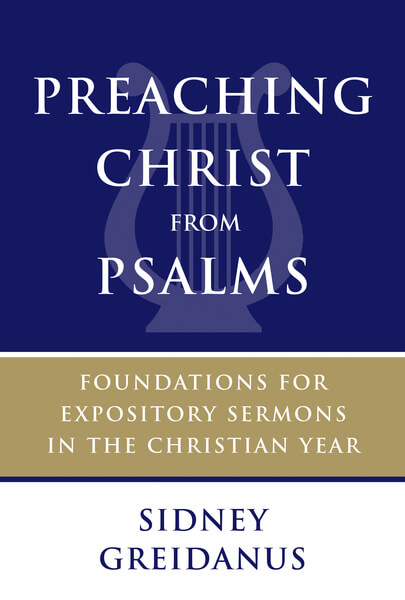
Sidney Greidanus
Reviewed by: Everett Henes
Preaching Christ from the Psalms, by Sidney Greidanus. Eerdmans, 2016. Paperback, 615 pages, list price $40.00. Reviewed by OP pastor Everett Henes.
The Psalms have given words to generations who want to praise God, to cry out to him in anguish or confusion, to call out for salvation, or simply to recount his wondrous deeds and marvelous provisions. They are, as Calvin wrote, “an anatomy of all the parts of the soul; for there is not an emotion of which any one can be conscious that is not here represented as in a mirror.”
At the same time, the Psalms can be a real challenge for the pastor to preach. Perhaps this is due to their scarcity in our worship. It might also be due to the fact that they are not historical narrative, prophecy, or epistles, but poetry.
A good tool to help think about the Psalms for preaching can be a big help. Sidney Greidanus’s works on preaching Christ from the Old Testament are well known to many readers. He is committed to preaching Christ from all of Scripture, and this book is no different. The pastor will find many helpful insights on preaching from the Psalms, along with ample examples of sermons.
The introductory chapter, “Issues in Preaching Christ from Psalms,” is a helpful guide to thinking about the various challenges and approaches to the Psalms.
Greidanus then lays out the various interpretive approaches: literary, historical, theocentric, and Christocentric. He applies these approaches to preaching Christ from an Old Testament text: redemptive-historical progression, promise-fulfillment, typology, analogy, longitudinal themes, New Testament references, and contrast. He also gives attention to applying the Psalms.
The rest of the book is filled with examples from various psalms. While not every psalm is touched on, Greidanus does cover the different types of psalms, so that the preacher learns how to handle the whole book.
While this book is a great help, there are a couple areas for caution. First, he asserts that the church’s acceptance and use of the Psalms are what make them the Word of God for the church: “Though many psalms originated as a human word to God, every psalm is now part of the Psalter and was accepted in the canon as God’s word for Israel” (p. 3). Here he cites father of canonical criticism, Brevard Childs. This is the kind of position that would trigger a slew of follow-up questions during a theology exam in presbytery.
Another interesting, and possibly challenging, feature of the book is its layout. The author fits various sermons into the seasons of the liturgical calendar. The regulative principle of worship raises serious objections to imposing such a calendar on the church. Nonetheless, this book can still be of great use to pastors and laypersons alike. In fact, it can be helpful to see how the Psalms fit in with events in the life of Christ. This serves to underscore the thesis of the book: the Psalms should be preached, and Christ should be faithfully preached from them.
Click here for a second review from Ordained Servant.
September 07, 2025
August 31, 2025
J. N. Darby and the Roots of Dispensationalism
August 24, 2025
August 17, 2025
Reformed Covenant Theology: A Systematic Introduction
August 10, 2025
August 03, 2025
July 27, 2025
© 2025 The Orthodox Presbyterian Church